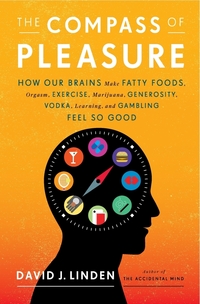Do you, like many, think that drug addicts become drug addicts because they derive greater reward from getting high than others? The biology says no. They actually seem to want it more but like it less. The scientific definition of addiction is actually rooted in the brain’s inability to experience pleasure.
 “There are variants in genes that turn down the function of dopamine signaling within the pleasure circuit,” explains Linden, a professor of neuroscience at the Johns Hopkins University School of Medicine and the chief editor of the Journal of Neurophysiology.” For people who carry these gene variants, their muted dopamine systems lead to blunted pleasure circuits, which in turn affects their pleasure-seeking activities, he says. “In order to get to that same set point of pleasure that others would get to easily — maybe with two drinks at the bar and a laugh with friends — you need six drinks at the bar to get the same thing.”
“There are variants in genes that turn down the function of dopamine signaling within the pleasure circuit,” explains Linden, a professor of neuroscience at the Johns Hopkins University School of Medicine and the chief editor of the Journal of Neurophysiology.” For people who carry these gene variants, their muted dopamine systems lead to blunted pleasure circuits, which in turn affects their pleasure-seeking activities, he says. “In order to get to that same set point of pleasure that others would get to easily — maybe with two drinks at the bar and a laugh with friends — you need six drinks at the bar to get the same thing.”
It is important to realize that our pleasure circuits are the result of a combination of genetics, stress and life experience, beginning as early as the womb. Crucially, brain imaging studies show that giving to charity, paying taxes, and receiving information about future events all activate the same neural pleasure circuit that’s engaged by heroin or orgasm or fatty foods.
via ‘The Compass Of Pleasure’: Why Some Things Feel So Good : NPR.
